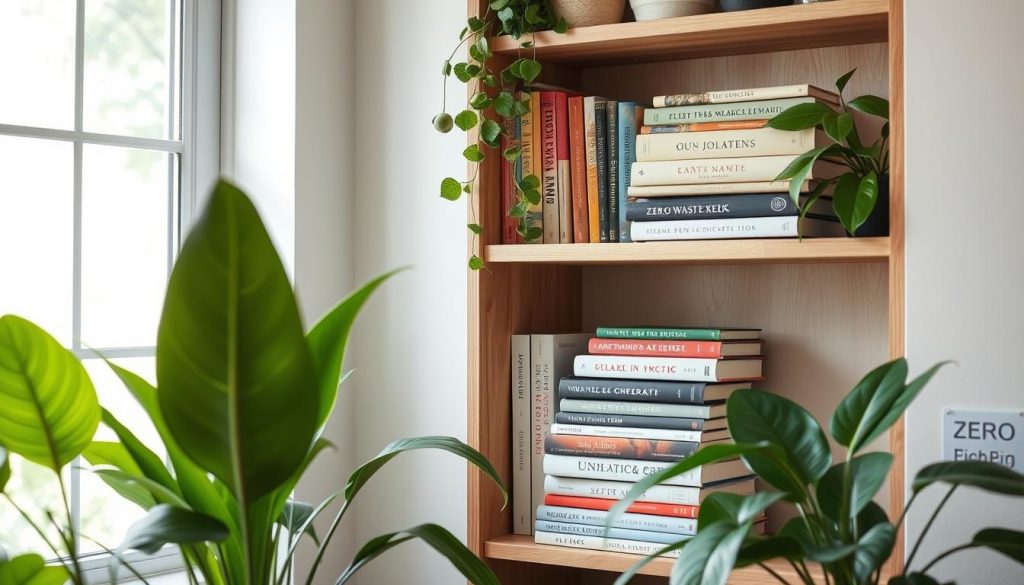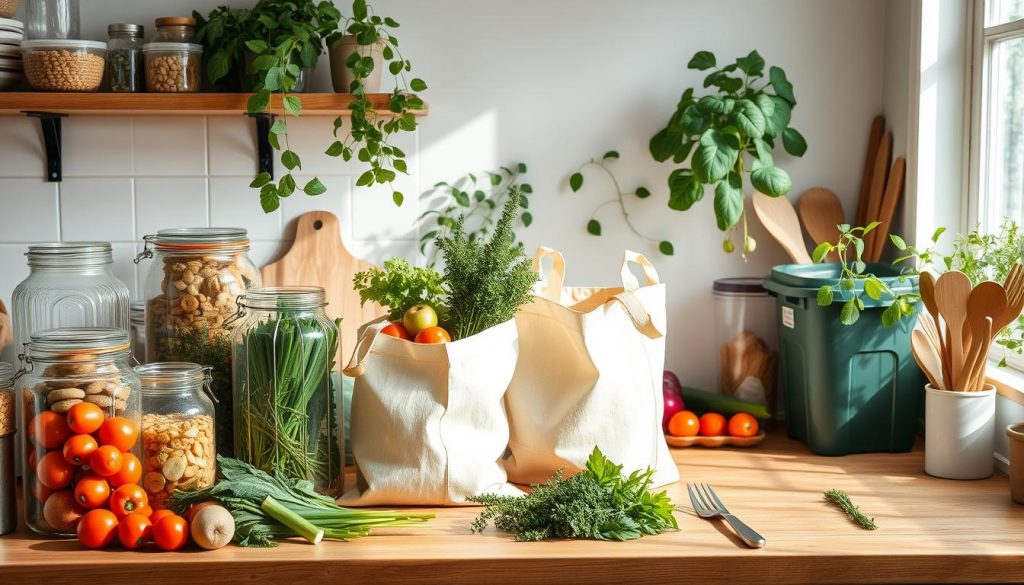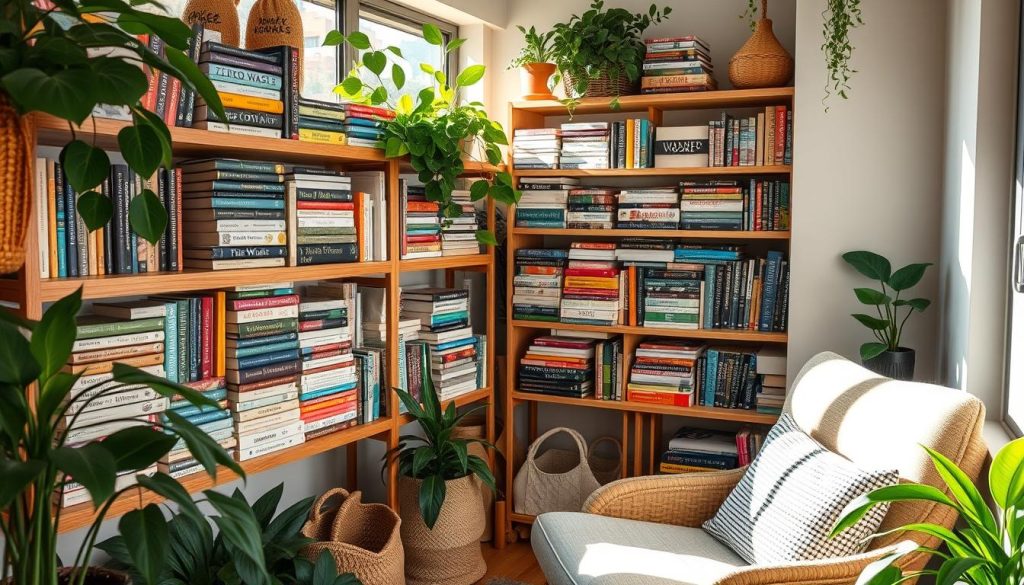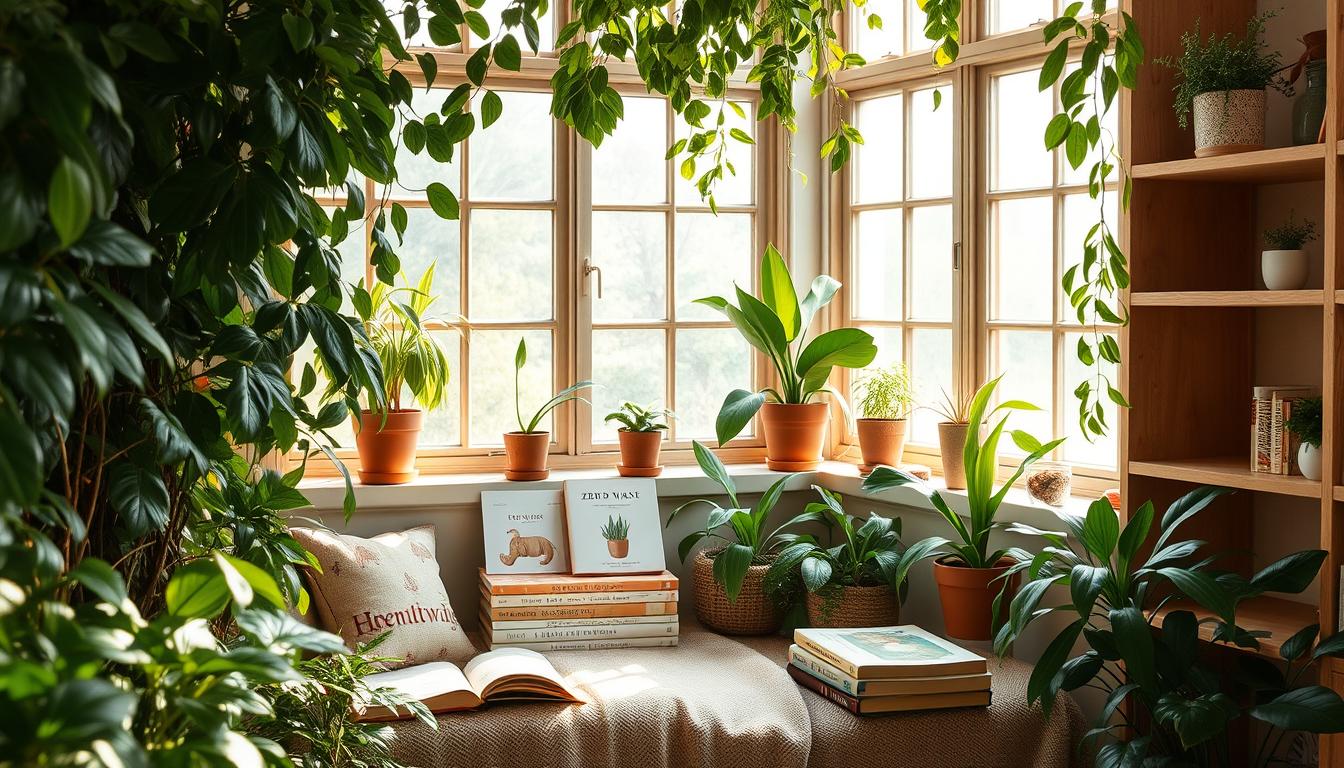I’m excited to share my favorite zero waste books and guides. They’ve helped me live more sustainably. In this article, I’ll explain why zero waste is key, share top resources, and offer tips for everyday living.
Whether you’re new to zero waste or already committed, you’ll find useful tips here. These resources can help you make choices that are better for the planet. Let’s explore how these books and guides can change your daily habits.
Why Zero Waste is Important to Me
I care deeply about the environment, and the zero waste movement is key to my lifestyle. It has not only helped the planet but also grown me personally. I feel more connected to taking care of our environment.
Understanding the Zero Waste Movement
The zero waste philosophy teaches us to reduce waste by changing how we consume. We reuse and recycle as much as we can. It’s about making choices that help our planet and future.
Environmental Benefits of Going Zero Waste
- Less waste means less strain on our natural resources.
- Reusing saves energy and resources, unlike making new things.
- It also cuts down on greenhouse gases from waste management.
Personal Growth through Sustainable Living
Living zero waste has changed me deeply. It made me think more about what I buy and use. I now value materials more and see the importance of caring for our planet.
This journey taught me to buy with purpose and value quality over quantity. I’ve found happiness in finding new ways to reuse and recycle. Zero waste has given me the power to help create a better future, step by step.
My Top Picks for Zero Waste Books

I’ve explored many resources on sustainable living, and some books stand out. They’ve helped me understand conscious consumption and make changes. Here are my top three picks for eco-conscious readers.
“Zero Waste Home” by Bea Johnson
Zero Waste Home” by Bea Johnson is a key book in the zero waste movement. Bea shares her family’s journey to minimal waste, offering a detailed guide. This book inspires me to reduce my environmental impact with practical solutions.
“The Zero Waste Lifestyle” by Amy Korst
The Zero Waste Lifestyle” by Amy Korst focuses on practical steps for sustainable living. It’s full of tips and strategies to make zero waste easy. Korst’s advice has helped me change my daily habits and live more sustainably.
“Waste-Free Kitchen Handbook” by Dana Gunders
“Waste-Free Kitchen Handbook” by Dana Gunders is essential for reducing food waste. Gunders provides tips, recipes, and insights to make your kitchen more eco-friendly. This book has been a game-changer for me.
These books have greatly influenced my understanding of zero waste living. They offer valuable insights and strategies for a more sustainable life. Whether you’re starting or deepening your eco-friendly journey, these resources are invaluable.
Essential Zero Waste Guides for Beginners

Starting an eco-friendly lifestyle and cutting down on waste can seem daunting. But, there are many guides and resources to help. Here, I’ll share key tips and steps to begin your waste-free journey.
Starting Your Zero Waste Journey
The first step is to look at your current habits and find areas for change. Start by doing a waste audit. Look at what you throw away daily and find sustainable alternatives.
Practical Steps for Everyday Life
- Get reusable bags, containers, and water bottles to cut down on single-use plastics.
- Choose secondhand or vintage items to use less resources.
- Try DIY projects for eco-friendly cleaning and personal care items.
- Start composting food and yard waste to keep it out of landfills.
Creating a Zero Waste Mindset
Adopting a zero waste lifestyle is a mental shift as much as a physical one. Aim for a minimalist lifestyle by decluttering and donating or recycling. Think about your purchases to avoid unnecessary waste.
The path to a zero waste lifestyle is gradual. Start small and celebrate your successes. With dedication and a focus on sustainability, you can make a big difference and improve your life.
How to Choose the Right Book for You

Choosing the right book for a sustainable lifestyle can feel overwhelming. But, it’s all about finding a book that fits your life, goals, and interests. By carefully considering these factors, you can find the perfect guide for a greener future.
Consider Your Current Lifestyle
Start by thinking about your lifestyle. Are you a busy professional or a homemaker? Knowing where you are in your sustainable journey helps narrow down book choices. This way, you find resources that meet your specific needs.
Identify Your Goals and Interests
Next, define your sustainable living goals and interests. Are you focused on reducing plastics or learning about composting? Knowing what you want to learn helps you find books that match your eco-friendly dreams.
Read Reviews and Recommendations
After understanding your lifestyle and goals, read reviews and recommendations. Look for feedback from eco-conscious readers and trusted sources. This helps you choose a book that will inspire and guide you on your sustainable path.
Notable Authors in the Zero Waste Community
The zero waste movement is growing fast. Many authors are now leading voices in environmental care and living green. Their books and guides are changing how we live, encouraging us to be more eco-friendly every day.
Bea Johnson’s Influence
Bea Johnson is a key figure in the zero waste world. Her book, “Zero Waste Home,” tells how she changed her family’s life. It has inspired many to think differently about what they buy and how they live.
How Lauren Singer Inspires Change
Lauren Singer is another big name in zero waste. Her book, “The Zero Waste Lifestyle,” helps people lower their environmental impact. Lauren’s easy-to-follow advice has motivated many to make big changes in their homes and communities.
Meet the Leading Voices
Bea Johnson and Lauren Singer are not alone. Many authors and leaders in the zero waste movement are making a difference. They share their knowledge and passion, helping readers live more sustainably and mindfully.
Incorporating Zero Waste Practices into My Home
I’ve learned a lot about living without plastic and the circular economy. I’ve cut down on single-use plastics and started composting and recycling. These eco-friendly habits are now part of my daily routine.
Reducing Single-Use Plastics
I’ve made a big change by using fewer single-use plastics. I now carry a reusable tote bag and a refillable water bottle. Saying no to disposable items has also helped a lot.
Composting and Recycling Efforts
Composting is key to reducing waste at home. I’ve set up a composting system to turn food scraps into garden soil. I also make sure to recycle properly to support the circular economy.
DIY Projects to Reduce Waste
I’ve taken up DIY projects to reduce waste. Making my own cleaning products and upcycling old items has been fun. It’s also helped me save money and feel creative.
Adopting zero waste practices has been rewarding. It’s shown me how small choices can make a big difference. Living without plastic and supporting the circular economy has been amazing for me and the planet.
Where to Find Zero Waste Resources Online
I’ve found many inspiring online resources on my zero waste journey. These include eco-friendly blogs and social media accounts. They offer valuable knowledge and support.
Blogs and Websites I Love
Websites like “Zero Waste Home” by Bea Johnson and “The Zero Waste Lifestyle” by Amy Korst are key. They share practical tips and personal stories. They help us understand sustainable living better.
Social Media Accounts to Follow
Social media makes it easy to stay updated on zero waste trends. I’m inspired by Lauren Singer’s Instagram and others in the zero waste community. Their content motivates me to live more eco-friendly.
Online Communities for Support
Online communities are also very helpful. Forums and discussion groups offer a sense of belonging. They let us share our experiences and learn from others.

